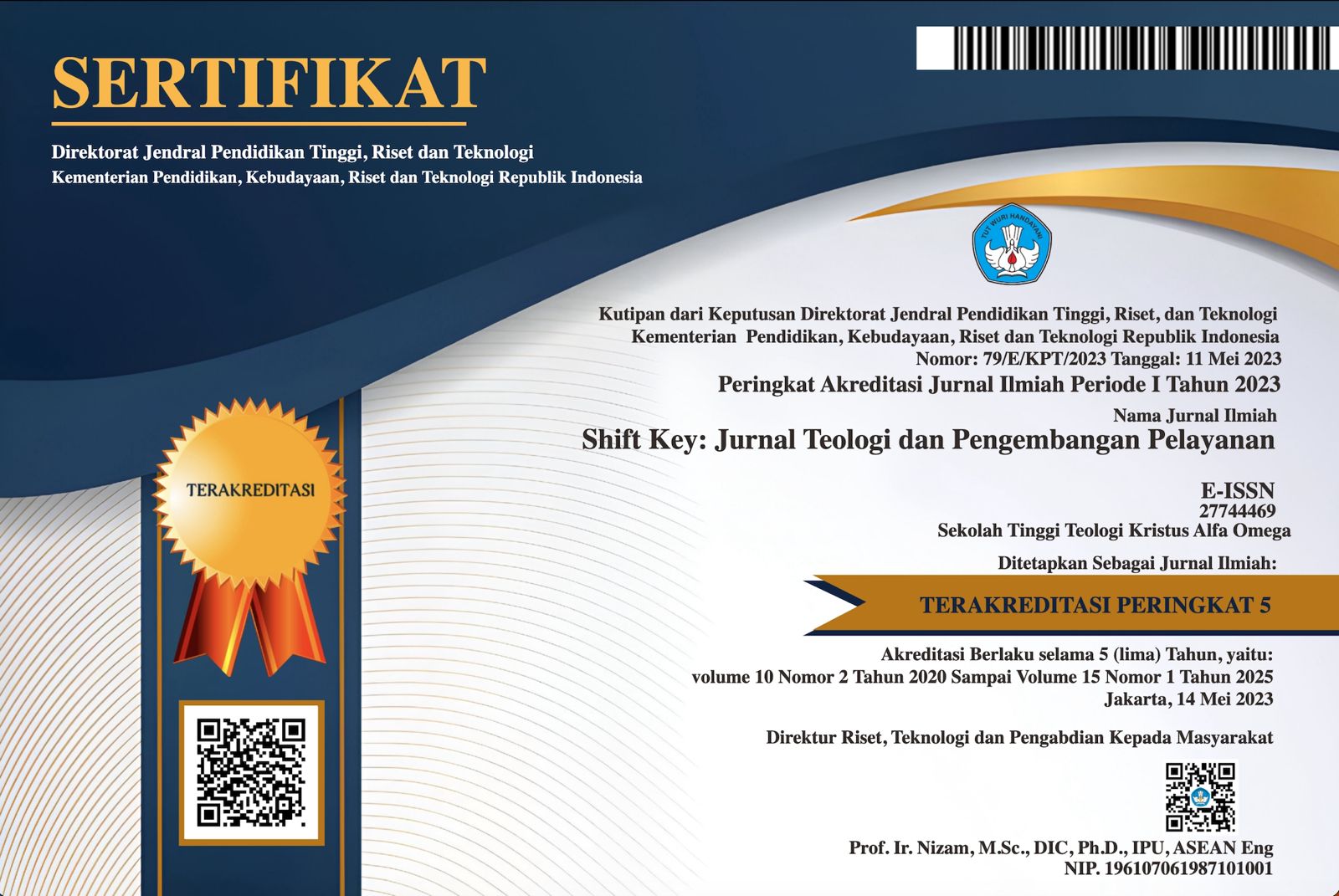PENINGKATAN KEDISIPLINAN ANAK DENGAN POLA ASUH YANG TEPAT MENURUT IBRANI 12:5-11
DOI:
https://doi.org/10.37465/shiftkey.v12i1.205Keywords:
Discipline, Draft, Hebrew 12, 5-11, ParentingAbstract
This study discusses parental education in disciplining children in Hebrews 12:5-11. There are errors in parenting patterns in disciplining children, causing acts of violence in the family, and this has a bad impact on children which is reflected in bad and difficult child behavior. Parents must understand the how to discipline their children properly and correctly based on the truth of God's Word. This study uses a qualitative method, especially a literature study approach, which is to collect data for analysis and is assisted by exposition approach to find the meaning in Hebrews 12:5-11. The results of the study revealed that the act of educating children is evidence of parental love, so parents must warn their children. If in disciplining children, there is an action to punish the child, then it is intended to bring good to the child; thus discipline is not to hurt but to give peace. The concept of education in the form of discipline, punishment, and instruction is aimed at shaping children's character for the better. Thus, the purpose of this study is to find the best way to discipline children, especially through the study of the interpretation of Hebrews 12:5-11.
References
“73,7 Persen Anak Indonesia Mengalami Kekerasan Di Rumahnya Sendiri.†Accessed December 21, 2021. https://tirto.id/737-persen-anak-indonesia-mengalami-kekerasan-di-rumahnya-sendiri-cAnG.
Anderson, Jack. “The Business of Hurting People: A Historical, Social and Legal Analysis of Professional Boxing.†Oxford University Commonwealth Law Journal 7, no. 1 (2007): 35–59. https://doi.org/10.1080/14729342.2007.11421477.
Browning, W.R.F. Kamus Alkitab. Jakarta: BPK Gunung Mulia, 2007.
Chapman, Gery, and Ross Campbell. The 5 Love Languages of Children. Yogyakarta: ANDI, 2020.
Douglas. Ensiklopedia Alkitab Masa Kini Jilid 1 A-L. Jakarta: Yayasan Komunikasi Buna Kasih/ OMF, 2011.
Hagelberg, Deve. Tafsiran Ibrani. Bandung: Yayasa Kalam Hidup, 1999.
Hasbi, Wahy. “Keluarga Sebagai Basis Pendidikan Pertama Dan Utama.†Jurnal Ilmiah Didaktika 12, no. 2 (2012): 245–58. https://doi.org/10.22373/jid.v12i2.451.
Hendrik Rawambaku. Metodologi Penelitian Pendidikan. Jakarta: BPK. Gunung Mulia, 2015.
Henry, Metthew. Tafsiran Matthew Henry Surat Ibrani, Yakobus, 1 & 2, 1-3 Yohanes, Yudas, Kitab Wahyu. Surabaya: Momentum, 2016.
Ilmu, Fakultas, Pendidikan Universitas, and Negeri Semarang. “Peran Kedisiplinan Terhadap Peningkatan Prestasi Olahraga Dan Kesehatan Siswa Sekolah Dasar.†Edukasi 1, no. 3 (2010).
Jarot, Wijanarko, Sunanto, and Gideon Apit. Berani Mendisiplin Anak. Jakarta: Keluarga Indonesia Bahagis, 2020.
Kalis Stevanus. Menjadi Orang Tua Bijak. Yogyakarta: Yayasan Pustaka Nusatama, 2016.
“KJV: King James Version,†n.d.
Lim, Do Kyun. “An Exegesis of Hebrews 12:1-3: Emulate the Endurance of Jesus.†ACTS Theological Journal 41 (2019): 177–214. https://doi.org/10.19114/atj.41.5.
Manurung, Kosma. “Strategi Orang Tua Kristen Dalam Membangun Disiplin Anak.†Visio Dei: Jurnal Teologi Kristen 3, no. 1 (2021): 22–39. https://doi.org/10.35909/visiodei.v3i1.177.
Meier, Paul. Christian Child-Rearing and Personality Devoloment. Beker Book House, 1980.
Morris, Leon. The Tyndale New Testament Commentaries Luke. Surabaya: Momentum, 2007.
Moulton, Harold K. The Analytical Greek Lexicon Revised. Edited by Harold K Moulton. Grand Rapids, Michigan: Regency Reference Library, 1977.
Mualifah. Psycho Smart Parenting. Yogyakarta: DIVA Press, 2009.
“NET: New English Translation,†n.d.
Neville, Robert Cummings. “Paideias and Programs for Theology without Walls.†In Theology without Walls: The Transreligious Imperative, 7–13, 2019. https://doi.org/10.4324/9780429000973-3.
Nitha Nurjana. “Teori Keluarga: Studi Literatur.†Universitas Jakarta, 2019, 10–26.
Panjaitan, Firman. “Membangun Nisbah Kehidupan Rumah Tangga: Tafsir Kolose 3:18-4:1.†GEMA TEOLOGIKA: Jurnal Teologi Kontekstual Dan Filsafat Keilahian 6, no. 1 (2021): 81–94. https://doi.org/10.21460/gema.2021.61.659.
———. “Stop Kekerasan: Tafsir Kejadian 4:17-26.†Academia Edu, n.d. https://www.academia.edu/39796977/STOP_KEKERASAN_Tafsir_Kej_4_17_26.
Panjaitan, Firman, and Marthin S. Lumingkewas. “Keadilan Dalam Hukum Lex Talionis: Tafsir Terhadap Keluaran 21:22-25.†Pengarah: Jurnal Teologi Kristen 1, no. 2 (2019): 73–84. https://doi.org/10.36270/pengarah.v1i2.13.
Partanto, Pius, and Trisno Yuwono. Kamus Bahasa Indonesia Untuk Guru. Surabaya: Arkola, 1994.
Sidjabat, B.S. Membesarkan Anak Dengan Kreatif. Yogyakarta: Yayasa Kelam Hidup, 2012.
Soesilo, Yushak. “Penggunaan Rotan Dalam Pendisiplinan Anak Menurut Kitab Amsal 23:13-14.†DUNAMIS: Jurnal Penelitian Teologi Dan Pendidikan Kristiani 1, no. 1 (September 1, 2016): 1. https://doi.org/10.30648/dun.v1i1.98.
“TB-LAI: Terjemahan Baru Lembaga Alkitab Indonesia,†n.d.
Wahyuni, Wiwit. Mengkomunikasikan Moral. Jakarta: Elex media Computindo, 2010.
Walean, Jefrie. “Katekisasi Dan Substansi Pendidikan Agama Kristen Di Era Postmodern.†Jurnal Salvation 1, no. 2 (2019): 1–11. http://jurnal.sttbkpalu.ac.id/index.php/salvation/article/view/10.
Wongso, Peter. Eksposisi Doktrin Alkitab Surat Ibrani. Malang: Seminar Alkitab Asia Tenggara, 1997.
Wycliffe. The Wycliffe Bible Commentary-Volume 3-Perjanjian Baru. Malang: Gandum Mas, 2001.
Yemima, Kezia. “Aplikasi Ibrani 12:5-13 Sebagai Model Pendidikan Karakter Disiplin Anak Generasi Z Dalam Keluarga Kristen Di Era New Normal Pandemi Covid-19.†EPIGRAPHE: Jurnal Teologi Dan Pelayanan Kristiani 5, no. 1 (2021): 15. https://doi.org/10.33991/epigraphe.v5i1.203.






